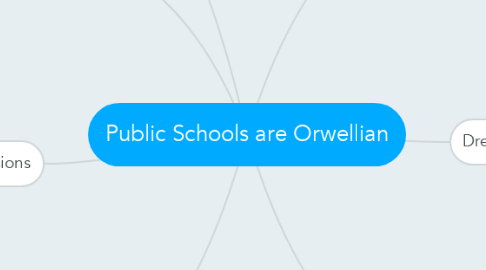
1. School lunches
1.1. Lunches limit their choices of what food they are eat. It controls the students and makes them consume food they are not sure what it is really made up of.
1.1.1. Safety violations and hazards in the kitchen. Food is made by students who are not aware of these rules.
1.1.2. Foods are frozen, processed, pre-packaged to feed large amounts of students, yet they are not fresh to eat. They can spoil over time.
1.1.3. Unidentified ingredients in food make children sick and they are unaware of what they are eating. They are not sure what is making them sick.
2. Dress code
2.1. Dress codes control what students can and cannot wear. It limits the freedom of expression and choice of what to wear.
2.1.1. Students who wear cultural headscarves are singled out by the administration because they believe it is violation the "no hats allowed" rule.
2.1.2. In America's individualistic society, the administration push for students to dress the same and do not think outside the box. They are not able to express themselves with clothing or fashion.
2.1.3. Administrators pull students from their class to change or call home. They believe their clothing to be distracting, yet they are the ones taking away class time from the students.
3. Common core
3.1. Common Core limits students' full abilities to learn. Math and English classes are focused on setting one pace for a whole grade.
3.1.1. Students who take summer math courses are more advanced in math, but are put into classes they have already mastered.
3.1.2. The concept of Common Core confuses students because of it's writing and descriptive way of doing math problems.
3.1.3. It controls the way students want to do their work. They are forced to work at a certain pace and solve things in a certain way.
4. Introduction
4.1. Public schools are treating their students in an Orwellian way because they are controlling the way they behave, what they wear, what they eat, and what they learn.
5. Connection to 1984
5.1. The Party vs. the Proles are treated like the administration vs. students. They are controlled and monitored constantly to make sure they are not trying to rebel against authority.
5.1.1. Their opinions and thoughts of how they dislike their treatment and limitations at school are similar to thoughtcrimes in Oceania.
5.1.2. In order to limit power and students coming together to rise against the admin, they stop their bad behavior like how Julia and Winston were sent to Room 101 after they expressed hate to Big Brother.
6. Concessions
6.1. Schools believe their healthy school lunches are decrease obesity rates, yet students who don't eat their food creates unhealthy habits of eating.
6.1.1. Students become wasteful of their food. This does not only affect the students, but also the school by losing money from their loss of food.
6.2. Parents and adults say they want their children to be able to express themselves and become their own person.
6.2.1. They contradict their argument by making students dress in an expected way.
6.3. Common Core is an efficient way of keeping students on track and making sure they are prepared after they leave grade school and off into the real world.
6.3.1. Students are limited to advanced classes because they are more encouraged to stay on track with their classmates. Some students are not meant to be at the same level as their peers.
7. Conclusion
7.1. Public schools strive for control when it comes to administration over students. They want to limit rebellion and power for the students.
7.1.1. What can we change about these issues? How can we change it? Which will be the first step to changing what we feel is wrong?

